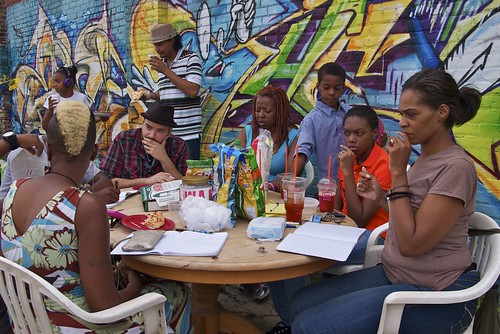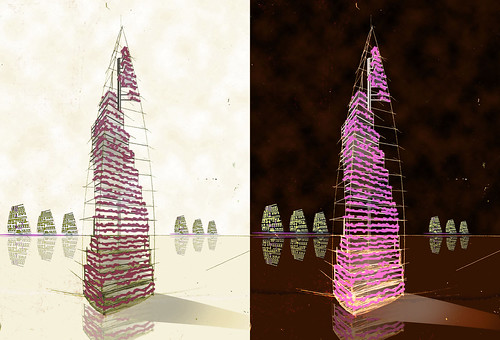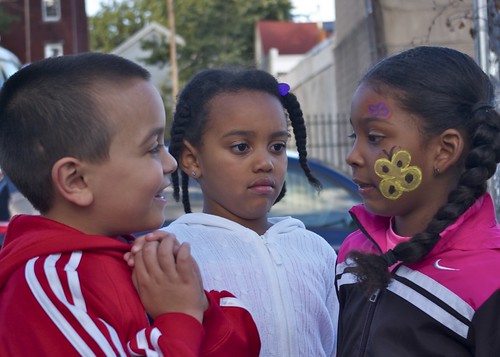by Bill Benzon, appendix by Charlie Keil
Writer’s Cypher, UMMI Living Village Community Garden, Jersey City, NJ
Adolescents seem gifted in the belief that, if only the adults would get out of the way and grow up, the world would be a much better place. In that sense I am still, at 66 going on 67 (Pearl Harbor Day of this year) an adolescent. I still believe that the world needs changing, though it’s been decades since I naively thought that letters to The New York Times were a reasonable means to that end. And I still believe that it’s the adults that need changing.
But I must also move forward in the realization that I too am an adult, and have been so for some time now.
What to do?
I painted this when I was nine or ten.
I was ten years old when the Russians put Sputnik into the heavens. I still remember the October evening when my father took me outside and pointed to a moving light in the night sky. “That’s it.”
That’s when my personal history joined world history. That’s the first event that was both personally meaningful to me–I’d been drawing sketches of spaceships for years and had even done a painting or two–and was also of world historical importance. By the time I was old enough to be an astronaut, however, I’d changed.
I’d gone to college, marched against the Vietnam War, done my conscientious objector’s alternative service in the Chaplain’s Office at Johns Hopkins, and lost all interest in becoming an astronaut. Inner space had become my territory.
I got my PhD, then a job at the Rensselaer Polytechnic Institute, was astounded when Reagan was elected and re-elected–that hadn’t been in the plan, no it hadn’t. And I was really surprised when the Soviet Union collapsed. After all, I’d grown up during the height of the Cold War, read articles about back-yard bomb shelters, and had even picked out the spot in our back yard where a shelter should go. I figured that, whatever else happened in the world, that I’d go to my grave in the shadow of the Cold War.
And now it was over. I did not, of course, believe all that happy talk about a peace dividend and the end of history. I knew the history would keep rolling along and that there were other occasions for strife than the ideological rifts between the East and the West. In this respect, the world did not disappoint me.
And yet, I had seen the world change. Not before my very eyes, but in my time. It’s one thing to read about such things in the history books, and to believe them, but it’s something else altogether to see it happen, to live through it.
Change is possible. All kinds of change. But the past keeps rolling around as well.
Thus I was not surprised when Pres. Bush the Younger decided to wage a War on Terror and invade Iraq. I got out my marching shoes and on March 22, 2003, reported for duty at the corner of 36th and 6th in Manhattan, where I met up with Charlie Keil, an intellectual hero of mine I’ve already written about here in 3QD.
The demonstration did no good. The invasion when ahead as planned, and promptly got mired down, not according to plan. But this demonstration was different from those we had back in the 60s. Back then, the music–if there was any–happened afterward. This time, we marched with music, me with my trumpet, Charlie with his cornet. We had no trouble finding drummers and horn players who wanted to get down and boogie on Broadway, or wherever it was that we were marching, and get down we did, interspersed with chants of “Peace Now.”
One might, I suppose, think that stopping a war is altogether too serious a business to be accompanied by music, dance, and chants. And one would be wrong. If we don’t dance in the process of trying to stop wars then chances are that, when we finally succeed–and we will–we’ll have forgotten how to dance. And all that effort will have been in vain.
So Charlie spends his time teaching kids how to drum and dance out there in rural Connecticut, where the Hotchkiss canon was invented, and we hook up every once in awhile and play for peace, joy, freedom, love, happiness, and, of course, for those pesky adults who keep on gumming up the works, most recently in Vermont:
That’s Charlie at the right on tuba. We were there to help a crew of Vermonters demonstrate for independence from the Union. I know, a quixotic quest, but a sensible one. The world’s stretched too tight, too many people and organizations shackled to big systems that are vulnerable to total collapse when a part fails. Remember the financial collapse that happened not too long ago when a bunch of 1%ers wanted a couple more Audis and Maserattis for the family compound and decided their mistresses needed them too?
Building Concept for World Island, renderings by Bob Kirchman (c) 2014
Meanwhile I’d met Zeal Greenberg, who was on a quest to create something he calls World Island, “a permanent World’s Fair for a world that’s permanently fair.” Think of it as a combination of the best features of the United Nations, Disney World, a kid’s rumpus room, the trading floor at the Chicago Board of Trade, the Bibliothèque nationale de France, and the Taj Mahal. It’s a small purpose-built international city where people from all nations, large and small, can meet on equal footing and participate in one another's worlds. Hotels, trade shows, theaters, museums, galleries, parks, playrooms, stores, restaurants, and an international school.
When I first met him, Zeal had been pounding the pavements for ten years on behalf of his plan and had gotten scores of serious people to donate their time and services to the cause. What surprised me was that all these executives would schedule us for a 20-minute meeting and end up giving us an hour or more. It’s a though they really wanted to see something like this happen, but couldn’t quite figure out where they fit in.
Charlie thinks that World Island would be the perfect place for a Global Organization of Democracies to supplant the UN:
I think we need a common GOOD, a Global Organization Of Democracies, one nation one vote, (so that a confederation of indigenous peoples up the Amazon can have the same voting power as the USA, Okinawa the same vote power as Japan, etc.) [big so-called democracies may not want to be members at first], to be meeting year round to suggest ways of: stopping “ethnic cleansing” and “administrative massacres,” terrorism, and wars; sharing air, water and resources fairly; raising global carbon taxes for local carbon sequestration (planting trees, fostering permacultures) going strong everywhere; planning and fostering a global literacy campaign focused on young women, etc., etc.
There’s a lot of good will and high hopes in the world that no one’s yet managed to tap. Maybe you’ll be one of those to break the code.
As I was scaling back my commitments to the World Island project I discovered the Lafayette Community Learning Garden. Built with volunteer labor and donated plants and materials, it transformed a couple of blocks in Jersey City in the summer of 2012. Children learned about sunflowers and grasshoppers and neighbors met neighbors. That summer, for the first time in 30 or 40 years, people had the City close down a block so they could have a proper celebration – you know that Kool and the Gang came from that neighborhood, don't you?
There was dancing in the street, literally. Six year olds and sixty year olds danced the Electric Slide, filling Pacific Avenue from side to side.
When Hurricane Sandy blew through later that year, that particular block was spared. But others only two or three blocks away were not. The friends I made in and about that garden came to my aid during the hurricane, and me to theirs. That’s what gardens to, turn mere neighbors into a community.
Who knows, with more gardens–there is, you know, a national movement afoot–there will be more communities. Real communities, that is, not just people living next to one another. And with more real communities in the world, perhaps we’ll change it, once again.
What choice do we have?
* * * * *
Reclaiming our Species Being: Humo Ludens collaborans
by Charlie Keil
Article 1 of Universal Declaration of Human Rights
All human beings are born free and equal in dignity and rights. They are endowed with reason & conscience and should act towards one another in a spirit of brotherhood.
The Ninth Amendment of the US Constitution
The enumeration in the Constitution, of certain rights, shall not be construed to deny or disparage others retained by the people…
…toward reclaiming reason and conscience thru the 'ignorance-based' worldview (W. Berry and W. Jackson, D. MacDonald)
from war to peace (Buddha, Diogenes, Christ, H. Thoreau, M. Gandhi, M. L. King)
from too big to fail back to small is beautiful (W. James, L. Kohr, E. F. Schumacher)
from global and regional famines back to local foods (F.M. Lappe)
from spend & consume back to save and conserve (W. Berry)
from national energy & dominance values back to local energy & resilience values (R. Hopkins)
from dominator values back to partnership values (Riane Eisler)
from drama back to dromenon (Jane E. Harrison)
from power-over-structures back to pleasure-in-processes (Marylin French)
from 'pure' meanings back to movements-feelings-meanings (Suzanne Langer)
from professionals back to players (Airto)
from work back to play (J. Huizinga, David Graeber)
from commodified music back to community musicking (L. Higgins)
from alienation back to participation (Owen Barfield)
from entropy back to sacrament (Gregory Bateson)
from linear discursive back to cyclical recursive (G. Bateson) from death wish & resistances back to life force and willingness from class & hierarchy back to classlessness & equality (K. Marx) from hubris/tragedy back to humility/comedy (@lcoholics @nonymous)
from transcendence back to immanence (S. de Beauvoir) (from immanence to trance-in-dance)
from exclusionarythinking back to incorporative thinking (Catherine Ellis)
from utilitariaian to spiritual (Jeremy Rifkin)
from spurious civilization to genuine prime cultures (E. Sapir)
from residual to emergent (Raymond Williams)
from products back to processes (R. Williams) from men's endless projects back to mind and Nature enough (Angie Keil*)
from efficiency back to sufficiency (J. Rifkin)
from legal world back to Natural world (Haudenosaunee via John Mohawk)
from land belongs to us back to we-belong-to-land (aboriginal peoples)
from unison back to lift-up-over-sounding (Kaluli via Steve Feld)
from anarchism back to being anarchs (Semai via R. K. Dentan)
from addiction to perfection back to participatory discrepancies (C. Keil)
from dismal sciences back to joyous sciences (R. Emerson, F. Nietzsche)
from me to we (Muhammad Ali)
* Angie Keil taught women's studies at SUNY Buffalo for years. She was born and raised in Greece and had a “feral childhood” when the Nazi's occupied the country. As a consequence she went schooless, yet managed to become educated. She ran with kids of all ages, not the age-segregated groups fostered by schooling on the factory plan.






